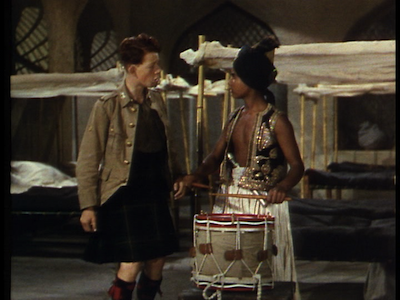 The Drum (1938) was one of the Korda Brothers' vehicles for Sabu, the Anglo-Indian child star who achieved fame with Elephant Boy (1937). This tale of deceit and derringdo in the Raj seems a trial run for The Four Feathers (1939) - understandably, since both draw from A.E.W Mason novels. Clunky and cliched, it makes passable entertainment.
The Drum (1938) was one of the Korda Brothers' vehicles for Sabu, the Anglo-Indian child star who achieved fame with Elephant Boy (1937). This tale of deceit and derringdo in the Raj seems a trial run for The Four Feathers (1939) - understandably, since both draw from A.E.W Mason novels. Clunky and cliched, it makes passable entertainment.British Captain Carruthers (Roger Livesey) runs undercover missions in the Indian Kingdom of Tokot. He discovers shipments of arms to rebels but can't find the culprits. Then Prince Guhl (Raymond Massey) orchestrates the murder of the pro-British King, seizing the throne himself. Young Prince Azim (Sabu) refuses Guhl's entreaties, befriending Carruthers, his wife (Valerie Hobson) and an English drummer (Desmond Tester). Together they must unravel Guhl's plot to massacre Tokot's British officials.
The Drum holds up visually. The Kordas pioneered location shooting, and The Drum was shot near Chitral (sight of a famous Victorian siege) on India's Northwest Frontier. It's beautiful, with Georges Perinal and Osmand Borrainde capturing ornate palaces and picturesque mountains. The party scene deserves special attention: director Zoltan Korda spends 15 minutes slowly building tension, intercutting Indian dances and a Highland reel with rebel preparations for massacre. The last act features a point-blank machine gun fight and an epic mountain battle, still impressive today.
Less endearing is The Drum's flaccid plotting. The Kordas pad the story with incidental vignettes of colonial life, building up British uprightness and Indian deviousness. At least the jingoism comes with a cynical edge: Carruthers muses that "law and order" often requires the murder of British officials! Carruthers at least makes an interesting lead, donning Indian disguise like Kipling's Kim by day, hosting swanky parties by night. The other British characters aren't a quarter so interesting.
Drum comes alive when Prince Guhl's on the scene: at least he's more crafty schemer than Gunga Din-style fanatic. His wicked glee in torture and assassination makes him an imposing villain, if hardly a progressive characterization. Worse, Azim is merely a plot pawn, shuffling listlessly through the story until his last act heroism. Viewers must decide if these stereotypes bother them; The Drum reportedly caused riots in 1930s India.
Sabu, charming as ever, is straight-jacketed in an underwhelming role. Roger Livesey is the real lead, dashing yet down-to-earth in his Colonel Blimp fashion. Valerie Hobson (Kind Hearts and Coronets) plays his fetching wife; Francis L. Sullivan (Oliver Twist) a pompous official. But it's Raymond Massey, devouring scenery and boggling his eyes in brown-face makeup and gilded turban, who steals The Drum. Massey's too endearingly wicked for political correctness to factor in.
Regardless, The Drum isn't among the Kordas' best work. Generous viewers can forgive the stereotypes; the weak story proves harder to overlook. Sabu was better-served by future collaborations with the Kordas: The Thief of Baghdad and The Jungle Book. And another A.E.W. Mason novel produced their masterpiece.

